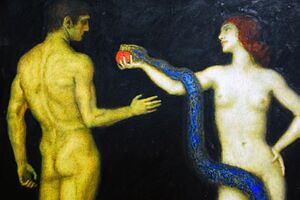Sexual conflict
Jump to navigation
Jump to search
Sexual conflict refers to diverging interests in males and females to optimize their fitness or the sexiness of the offspring over many generations, increasing the average fitness of one's own sex at the cost of the average fitness of the other sex. The sexes of many species literally engage in a war over the course of evolution.[1]
Examples of sexual conflict in humans[edit | edit source]
- From the point of view of women, fitness is optimized if the mate cares for the young thus freeing resources (e.g., time and energy) that can be invested in additional offspring, but caring for a single woman, the man needs to forego other mating opportunities.
- Men seek extra-pair copulations (affairs) because they can scatter their seeds, but this is at odds with women fitness as they depend on men's resources, hence women seek men who invest in them by attracting them with a reputation of faithfulness and looks, and by conservatively rewarding romance and other signals of investment by some controlled amount of affection. Only in case of very good looking men, women's desire for investment is offset by the promise for the genes for good looking offspring (sexy sons hypothesis).
- In a polygamous setting, male reproductive success is optimized by having mated with multiple females, but female's reproductive success is reduced as the man distributes his sex drive among multiple women.[2][3] This may be offset by higher quality offspring though, or simply better looking ones as discussed in the previous point. Various studies demonstrate that females are able to detect “attractive” males by secondary sexual characteristics such as ornamentation (i.e. good looks).[2]
- Women can also conspicuously display their secondary sexual characteristics which have possibly evolved from positive feedback in sexual selection. Thereby women can hope to acquire a higher quality man. This is why most women crave sexual attention. Men however, dislike when their partner whores for attention because it increases the risk of being cuckolded. Avoiding being cuckolded is essentially mate guarding and this kind of intuition may also drive hate for sluts overall, simply to discourage behavior they do not want to see in their own mate. But not just men dislike it. Historically, marriages were predominantly arranged and marriage was a question of passing on family wealth, hence the entire family had an interest for women to be faithful to avoid spending their resources on some other man's offspring. This is likely one reason why women have been heavily controlled and sequestered away in many cultures, not only by the men, but also the man's parents.[4][5][6] So there is a sexual conflict between entire families and women conspicuously advertising themselves. This intuition, possibly of evolutionary origin, may also be the driver of literary tropes like Eve spoiling everything in paradise as this puts pressure on females to behave and to be controllable.
- As mentioned in the slut article, women generally tend to benefit from chaos in their sexual strategy as it promises new hope of securing a better partner. Men, on the other hand benefit from order because chaos means they have to compete again for reproductive opportunities and heavily invest in courtship display again.
- The feminine imperative is a collection of adaptations that emerged from women to maximizing their fitness, often at the cost of men's fitness, e.g. single mothers who are single because they got pumped and dumped by Chad, demanding to be cared for by tax money, thereby decreasing men's accumulation of wealth which men need to impress women, and thereby decrease men's fitness.
See also[edit | edit source]
References[edit | edit source]
- ↑ https://www.youtube.com/watch?v=iMCtE2-YsLc
- ↑ 2.0 2.1 https://onlinelibrary.wiley.com/doi/abs/10.1002/ajhb.10045
- ↑ https://academic.oup.com/beheco/article/19/2/456/214088
- ↑ https://quillette.com/2018/11/25/on-the-nature-of-patriarchy/
- ↑ http://www.femininebeauty.info/suppression.pdf
- ↑ https://www.sciencedirect.com/science/article/abs/pii/S109051381730363X


